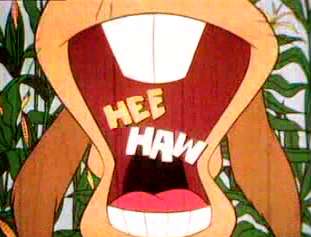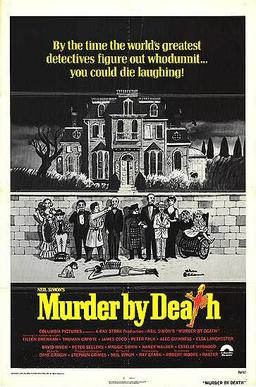Related Research Articles

Hee Haw is an American television variety show featuring country music and humor with the fictional rural "Kornfield Kounty" as the backdrop. It aired from 1969 to 1993, and on TNN from 1996 to 1997. Reruns of the series were broadcast on RFD-TV from September 2008 to April 2020, and aired on Circle.

Stand-up comedy is a type of comedy performance directed to a live audience in which the performer stands on a stage and delivers humorous and satirical monologues, with occasional physical acts. The performance is usually a rhetorical sketch with rehearsed scripts, but many performers also employ varying degrees of live crowd interaction as part of their routine. Stand-up comedy consists of one-liners, stories, observations, or shticks that may incorporate props, music, impressions, magic tricks, or ventriloquism.

Rowan & Martin's Laugh-In is an American sketch comedy television program which ran for 140 episodes from January 22, 1968, to March 12, 1973, on the NBC television network, hosted by comedians Dan Rowan and Dick Martin. It originally aired as a one-time special on September 9, 1967, and was such a success that it was brought back as a series, replacing The Man from U.N.C.L.E. on Mondays at 8 pm (ET). It quickly became the most popular television show in the United States.
Edward Mayhoff 'Ed' Grimley is a fictional character created and portrayed by Martin Short. The original concept came from the stories told by Bob Ingram about his childhood imaginary friend. Developed amongst The Second City improv comedy troupe, Grimley made his television debut on the sketch comedy show SCTV in 1982, leading to popular success for both Short and the persona. Short continued to portray Grimley on Saturday Night Live and in various other appearances. The character also starred in Hanna-Barbera's 1988 animated series The Completely Mental Misadventures of Ed Grimley, and appeared in Short's comedy specials I, Martin Short, Goes Hollywood and I, Martin Short, Goes Home.

Just for Laughs Gags is a Canadian silent comedy/hidden camera reality television series that is under the Just for Laughs brand created by Pierre Girard and Jacques Chevalier.

Murder by Death is a 1976 American comedy mystery film directed by Robert Moore and written by Neil Simon. The film stars Eileen Brennan, Truman Capote, James Coco, Peter Falk, Alec Guinness, Elsa Lanchester, David Niven, Peter Sellers, Maggie Smith, Nancy Walker, and Estelle Winwood.

The Great Space Coaster is a children's television show that was broadcast in first-run syndication from 1981 to 1986.
Christopher Franklin is an Australian stand-up comedian and former sailor for the Royal Australian Navy. He is most famous for performing the song "Bloke", which was certified platinum, reached No. 1 on the ARIA Charts, and was the twelfth-biggest-selling single in Australia in 2000. He lives in Launceston, Tasmania.
Peter Rowsthorn is an Australian stand-up comedian, actor, writer, producer, MC, host and theatre.

Brian Nankervis is an Australian writer, actor, radio host, television producer and comedian. He is one of the co-creators of the music quiz show, RocKwiz and co-hosts The Friday Revue with Jacinta Parsons on ABC Radio.

Down the Line is a British radio comedy broadcast on BBC Radio 4, which satirises popular radio phone-in shows. The show, hosted by "Gary Bellamy", is semi-improvised and is written and performed in a style of heightened realism.
"The Coup" is the third episode of the third season of the American comedy television series The Office and the show's thirty-first episode overall. It first aired on October 5, 2006, on NBC in the United States.
"The Negotiation" is the nineteenth episode of the third season of the American comedy television series The Office and the show's forty-seventh episode overall. The series depicts the everyday lives of office employees in the Scranton branch of the fictional Dunder Mifflin Paper Company. In this episode, Roy Anderson tries to attack Jim Halpert for kissing Pam Beesly on Casino Night, only to be pepper-sprayed by Dwight Schrute. Jim repeatedly tries to thank Dwight for his actions, but each attempt is rejected. Meanwhile, with Roy fired, Darryl Philbin asks for a raise and is astounded when he learns that this raise would cause him to be paid more than his boss, Michael Scott.

Gavin & Stacey is a British sitcom written by James Corden and Ruth Jones about two families: one in Billericay, Essex; one in Barry, Vale of Glamorgan. Mathew Horne and Joanna Page play the eponymous characters Gavin and Stacey, while Corden and Jones star as Smithy and Nessa. Alison Steadman and Larry Lamb star as Gavin's parents Pam and Mick, Melanie Walters plays Stacey's mother Gwen, and Rob Brydon plays Stacey's uncle Bryn.
Letters to Laugh-In is a daytime game show and spin-off of NBC's nighttime comedy series, Rowan & Martin's Laugh-In, that aired on the network from September 29 to December 26, 1969. The show was hosted by Gary Owens, the announcer for Laugh-In.
"The Ungroundable" is the 14th and final episode of the 12th season of the American animated series South Park, and the 181st episode of the series overall. It originally aired on Comedy Central in the United States on November 19, 2008. This is the last episode of South Park to be broadcast in 480i standard definition. The episode was rated TV-MA L in the United States. The episode spoofs vampire films including the Twilight craze and The Lost Boys, where Butters believes that he sees vampires in the school.

This Is Nightlive was an Irish satire television series broadcast on RTÉ Two. It was created by John Ryan who also starred in the series.
"Trivia" is the eleventh episode of the eighth season of the American comedy television series The Office, and the show's 163rd episode overall. The episode originally aired on NBC in the United States on January 12, 2012. It was written by Steve Hely and was directed by executive producer B. J. Novak.
Lynda Jane Wiseman "Gibbo" Gibson was an Australian comedian and actress.
References
- 1 2 Matthews, Kate. "Let the Blood Run Free (1990–1992)". Australia's audio and visual heritage online. Retrieved 12 September 2018.
- ↑ "Brian Nankervis". National Film and Sound Archive. 2 June 2016. Retrieved 12 September 2018.
- ↑ Wallace, Mark (20 August 1990). "Something different for Monday nights". The Age. p. 4. Retrieved 12 September 2018– via Trove.
- ↑ Juddery, Mark (6 January 1991). "Looking back over some TV oddities in the past 12 months". The Canberra Times. p. 16. Retrieved 12 September 2018– via Trove.